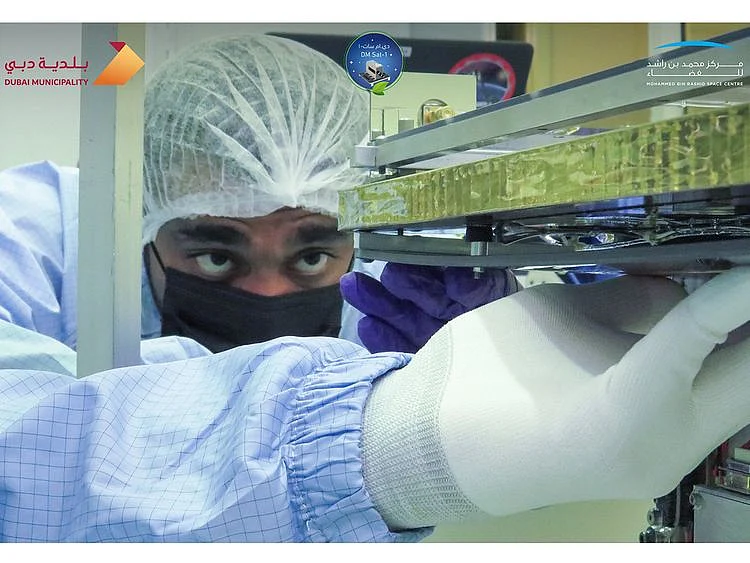Final checks on DMSat-1 done prior to launch in Kazakhstan on Saturday
High-performance nanosatellite designed to perform multi-spectral observations

Also In This Package
Dubai: Engineers at the Mohammed Bin Rashid Space Center (MBSRC) have done the final tests on DMSat-1, the region’s first environmental nanometric satellite that will be launched on Saturday.
The satellite is expected to separate from the launch vehicle into its orbit at 2.20pm (UAE time) and send its first signal at 3pm (UAE time).
“MBRSC engineers conducted the final tests on DMSat-1, the first nanometric environmental satellite for Dubai Municipality. The satellite is scheduled to be launched on March 20 at 10.07am (UAE time),” MBRSC tweeted on Monday.
The satellite, which will be launched from the Baikonur Cosmodrome in Kazakhstan, is part of the UAE’s high-technology project to develop solutions to environmental challenges and address climate change.
DMSat-1 or Dubai Municipality (DM) Sat 1 will monitor the aerosols and greenhouse gases as well as provide data for environmental research and studies. The nano satellite will boost DM’s technical capabilities in environmental monitoring and development of strategies to reduce atmospheric pollution and address other challenges posed by climate change and environmental degradation.
Solution to environmental challenges
Data provided by the satellite will be used in several areas, including finding solutions to environmental challenges, developing long-term plans to address urban pollution and climate change and environmental forecasting in Dubai.
DMSat-1, which weighs only 15kg, is a high-performance nanosatellite designed to perform multispectral observations. It has three scientific instruments, including multispectral polarimeter used to monitor air quality and detect fine particles in the atmosphere and a pair of spectrometers that will be used to detect greenhouse gases (carbon dioxide and methane).
Also Read
Two astrophysicists debunk Elon Musk’s prediction that humans can live on Mars soonUAE’s Hope Probe moves to science orbitUAE to tap private sector to boost country’s space industryWatch: Hazzaa Al Mansoori and Sultan AlNeyadi train for spacewalk at NASAThe satellite, which operates in three bands — blue, red and infrared — was manufactured in 18 months at MBRSSC. It is capable of covering an area of up to 80,000 square kilometres each day.
DMSat-1 will monitor a single site more than once from seven different angles. Data will be stored on the onboard storage system and downloaded to MBRSC’s ground station. It will orbit Earth 14 times a day and will pass over the MBRSC ground station four to five times a day to receive new imaging orders and enable downloading of data.
Sign up for the Daily Briefing
Get the latest news and updates straight to your inbox
Network Links
GN StoreDownload our app
© Al Nisr Publishing LLC 2026. All rights reserved.